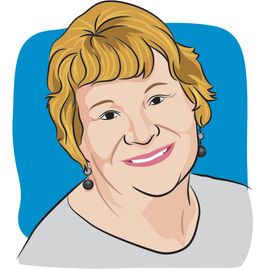- About Us
- Advertise / Support
- Editorial Board
- Contact Us
- CancerNetwork.com
- TargetedOnc.com
- OncLive.com
- OncNursingNews.com
- Terms & Conditions
- Privacy
- Do Not Sell My Information
- Washington My Health My Data
© 2025 MJH Life Sciences™ and CURE - Oncology & Cancer News for Patients & Caregivers. All rights reserved.
Cancer Exacerbated My COVID-19 Fatigue

Jane Biehl is a 12-year survivor of a very rare form of blood cancer, known as myelodysplastic syndrome (MDS). She has enjoyed several exciting careers including a librarian, counselor, teacher, and writer. She loves to write about surviving cancer, overcoming hearing loss and the wonderful benefits of having a hearing-ear service dog.
I’ve experienced fatigue from cancer before but contracting COVID-19 took it to a whole other level.
Fatigue is a word that appears repeatedly as a side effect or consequence of cancer and chemo. The dictionary definition is “feeling overtired, with low energy and a strong desire to sleep that interferes with normal daily activities.”
This sounds like a bland definition for a serious problem. Many articles have been written on fatigue, which impacts everything we do from climbing out of bed in the morning to falling back into bed at night. There are many synonyms such as lethargy, weakness, weariness, exhaustion, malaise and on and on.
When I came down with a mild case of COVID-19, I was told by the nurse practitioner at Urgent Care, who had just returned from having it that, “I was so tired I was sleeping 12 hours a day.” If this insidious disease did this to her, what would it do to me?
My other symptoms, including horrible runny nose, slight cough and congestion, subsided within a week. I also read that with the newest variant (there is always a new one as we know) any allergies are exacerbated. Since northeast Ohio, where I live, is a hotbed for allergies, I found this to be true.When I went outside, my sneezing was nonstop, the nose was running even more, but nothing serious and that all eventually improved.
What has remained, however, is the continued, always-present, restricting and terrible fatigue. I thought I would be more used to it because of being a cancer survivor but this felt different. Imagine trying to slog through a huge amount of maple syrup, where just to lift an arm or leg exerts every single muscle of effort. You walk around the house for a few minutes and have to sit. You go to dinner with a friend (not cook – eat out) and it takes you all evening to feel up to getting ready for bed! You sleep 10 or 11 hours and still have trouble climbing out of bed to get dressed in the morning.
My friends have noticed that difference and kidded me that when they contact me to go out, I have all day free instead of part of the day. Meaning I can only plan one event a day. Fortunately, I have a dog that needs to be walked and I force myself to do that, helping me to get my much-needed exercise. She comes back wanting to go again while I collapse on the couch.
My research showed me that with mild symptoms of COVID-19, it generally takes two to three weeks for fatigue to dissipate. It is already past that benchmark, and I know that it will take longer for me. How much longer I don’t know.
This is the reality we cancer survivors live in. If we catch something else like any kind of infection, it takes us longer to get over it. I am trying not to be bitter about the fact that it took three years for me to summon the courage to fly and I came back with COVID-19. It makes me hesitant to fly again.
But like all of us, I persevere. I force myself to push through the maple syrup and take my dog for a walk, because I don’t want to lie on the bed or couch all day. I try not to worry about the fact I may not be able to fly again for a while, because worry just takes precious time away from living the present. There is too much living to do and I think we all know that!
For more news on cancer updates, research and education, don’t forget to subscribe to CURE®’s newsletters here.
Related Content:



